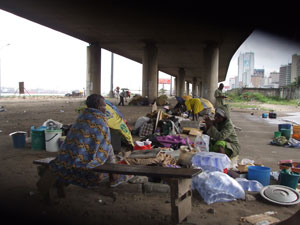

Nigeria has been rated number one on the list of countries with the highest number of homeless people, according to recent data by Stativerse. This revelation comes amid rising concerns over poverty, displacement, and inadequate housing across numerous nations.
The country’s rapid population growth, coupled with economic challenges and inadequate urban planning, has exacerbated the situation.
According to a report, out of the top 10 countries in Africa with the highest level of homelessness, Nigeria and Egypt are leading with over 24 million and 12 million, respectively.
Many Nigerians live in overcrowded informal settlements, often without access to basic amenities like clean water and sanitation. The government faces mounting pressure to implement effective housing policies to address this critical issue.
India follows with 18 million homeless individuals, driven by widespread poverty, rural-to-urban migration, and insufficient affordable housing. Major cities like Mumbai and Delhi see large populations living in slums and on the streets, struggling to survive in precarious conditions.
Mexico ranked third, with 14 million homeless. Economic inequality, violence, and natural disasters have contributed to the homelessness crisis. Many Mexicans live in substandard housing, while efforts to provide affordable housing lag behind the growing demand.
The report highlighted other countries with significant homeless populations. Bangladesh and Syria had 5.6 million and 5.3 million homeless people, respectively.
Syria’s civil war has displaced millions, leading to one of the world’s worst humanitarian crises. In Bangladesh, poverty and frequent natural disasters, such as floods and cyclones, left many without secure housing.
The Philippines (4.5 million), Uganda (4 million), and Argentina (3.4 million) also featured prominently on the list, each grappling with their unique socio-economic challenges that contribute to homelessness.
Homelessness is not confined to developing countries. The United States, with 2 million homeless individuals, struggles with affordable housing shortages, rising rents, and economic inequality. European countries like the United Kingdom (380,000), France (330,000), and Germany (262,000) also face significant homeless populations driven by factors such as immigration, economic disparities, and housing market constraints.
However, some nations have successfully minimised homelessness, probably due to population level. Iceland, with only 349 homeless people, and Singapore, with 1,000, exemplify effective housing policies and robust social safety nets.
These countries provide models for others to follow, demonstrating that with the right policies and resources, homelessness can be significantly reduced.
Most Homeless Countries 2024 :
1.🇳🇬Nigeria- 25m
2.🇮🇳India- 18m
3.🇲🇽Mexico- 14m
4.🇧🇩Bangladesh- 5.6m
5.🇸🇾Syria- 5.3m
6.🇵🇭Philippines- 4.5m
7.🇺🇬Uganda- 4m
8.🇦🇷Argentina- 3.4m
9.🇵🇰Pakistan- 3m
10.🇸🇩Sudan- 3m
11.🇪🇬Egypt- 2.7m
12.🇳🇵Nepal- 2.5m
13.🇺🇸United States- 2m
14.🇨🇩DR Congo-…— Stativerse (@Stativerse_) May 16, 2024
Call to Action
The 2024 data show the urgent need for comprehensive global action to tackle homelessness. Governments, international organisations, and NGOs must collaborate to address the root causes, including poverty, inequality, and displacement.
Investing in affordable housing, social services, and economic development is crucial to alleviating the global homelessness crisis.
Read: Women Affairs Minister Withdraws Suit Against Niger Assembly Speaker Over Orphan Mass Marriage
About The Author
Related Articles
MultiChoice Pumps GH¢200 Million Into Ghana’s Creative Industry
MultiChoice Ghana has invested more than GH¢200 million into the country’s creative...
ByWest Africa WeeklyMarch 5, 2026FIFA Confirms DR Congo Playoff Spot, Ending Nigeria’s World Cup Dream
Nigeria’s hopes of qualifying for the 2026 FIFA World Cup have come...
ByWest Africa WeeklyMarch 5, 2026Ghanaians to Travel to St Kitts and Nevis Without Visa
Ghanaian citizens will soon be able to travel to the Caribbean nation...
ByWest Africa WeeklyMarch 5, 2026Ghana Records Sharp Drop in Inflation, Lowest Since 2021
Ghana’s inflation rate dropped to 3.3 percent in February 2026, marking the...
ByWest Africa WeeklyMarch 5, 2026










